Happy Monday! In today’s edition of headline Mad Libs, the [TRUMP CAMPAIGN] is beefing with [CELINE DION] because the former president played [“MY HEART WILL GO ON”]—the theme song from a movie about [A SINKING SHIP]—at his rally in [MONTANA] without [DION’S] permission.
Quick Hits: Today’s Top Stories
- Ukrainian President Volodymyr Zelensky confirmed on Saturday night that his nation’s military is engaged in fighting in Russia’s Kursk oblast, days after Ukrainian forces first crossed into the region on Tuesday. Moscow officials have acknowledged that Ukrainian soldiers have marched nearly 20 miles into Russian territory, marking Kyiv’s most significant operation across its adversary’s border since Russia’s invasion of Ukraine in early 2022. Despite a rush of Russian troop and weapon reinforcements to the area and heavy fighting over the weekend, Russia has so far failed to stop the incursion.
- President Joe Biden on Sunday gave his first sit-down interview since withdrawing from the 2024 presidential race, telling CBS News’ Robert Costa that he stepped aside because of his potential effect on down-ballot candidates. “A number of my Democratic colleagues in the House and Senate thought that I was going to hurt them in the races,” Biden explained. “And I was concerned if I stayed in the race, that would be the topic.” The president also said that if Trump loses the election he didn’t think there would be a peaceful transfer of power in January. “If Trump loses, I’m not confident at all,” Biden said. “He means it, all the stuff about, ‘If we lose, there’ll be a bloodbath, it’ll have to be a stolen election.’”
- A Brazilian plane carrying 62 people crashed near the capital of São Paulo on Friday, killing all passengers and crew on board. Video recorded by onlookers shows the aircraft, an ATR 72-500 operated by regional airline Voepass Linhas Aéreas, spiraling to the ground over a residential area before crashing into a yard and exploding. Flight investigators continue to probe what caused the plane, en route to São Paulo’s Guarulhos International Airport, to stall and drop 17,000 feet in one minute.
- The Israel Defense Forces (IDF) struck a school compound in northern Gaza on Saturday that the IDF said Hamas and Palestinian Islamic Jihad were using as a military headquarters. The Hamas-run civil defense agency in Gaza said 90 people sheltering in the building died in the attack—a figure Israeli officials described as inflated—and the IDF released a list of 19 Hamas and Islamic Jihad terrorists Israeli officials assessed were killed in the strike. “We are deeply concerned about reports of civilian casualties in Gaza following a strike by the Israel Defense Forces on a compound that included a school,” White House National Security Council spokesman Sean Savett said in a statement, adding the administration is in contact with Israeli officials about the incident. Rear Adm. Daniel Hagari, an IDF spokesman, said the military “took numerous steps to mitigate the risk to civilians” before conducting the strike with “very precise munitions.”
- Hamas leaders on Sunday rejected an invitation to participate in ceasefire negotiations with U.S., Qatari, and Egyptian government officials planned for Thursday. Hamas officials claimed they wanted to return to negotiations discussed at a previous meeting in early July, saying new talks “would provide cover for the occupation’s aggression and grant it more time to continue its genocide against our people.” Israel said last week its negotiators would attend the meeting, but Axios reported yesterday that Israeli officials now believe Iran could launch an attack on Israel—in retaliation for the targeted killing of Hamas leader Ismail Haniyeh in Tehran last month—before ceasefire negotiations are set to begin on August 15.
- Former President Donald Trump’s campaign confirmed to Politico on Saturday that it had been hacked after the outlet received internal campaign documents—including a research dossier on Trump’s running mate, Sen. J.D. Vance of Ohio—from an anonymous email. Trump spokesman Steven Cheung blamed the hack on “foreign sources hostile to the United States,” citing a recent Microsoft report that said Iran is attempting to influence the presidential election, though offered no specific evidence to back up the claim. A National Security Council spokesperson told the media on Saturday that the White House takes the hacking “extremely seriously.”
- The Wall Street Journal reported Sunday that the U.S. has offered amnesty to Venezuela’s socialist president, Nicolás Maduro, if he cedes power to opposition candidate Edmundo González following last month’s presidential election. Maduro—who has dubiously claimed reelection to a third term despite evidence of his opponent’s victory—and 14 other current and former Venezuelan officials face multiple U.S. drug trafficking and corruption charges, but the U.S. government may not pursue them if Maduro leaves office at the end of his term in January. Maduro and his allies have suppressed public opposition to his regime in the weeks since the election, arresting more than 2,200 protesters. According to a local human rights group, at least 23 people have died since the election at the hands of security forces and pro-Maduro paramilitary groups.
- The State Department said Friday that the United States will resume offensive weapons sales to Saudi Arabia after a three-year pause aimed at forcing the country to end its intervention in the Yemeni civil war. The Biden administration has reportedly approved an air-to-ground munitions transfer and will review future weapons shipments to the Arab kingdom on a “case-by-case basis.” U.S. officials enacted the weapons freeze in 2021 due to concerns over Saudi strikes on civilian targets in the Kingdom’s military campaign against Iranian-backed Houthi rebels in Yemen. A senior Biden administration official told Reuters the resumption of arms sales is the result of Saudis having “met their end of the deal” with the end of civilian strikes in 2022.
- Both major party nominees for the open U.S. Senate seat in Michigan—Rep. Elissa Slotkin, a Democrat, and former Rep. Mike Rogers, a Republican—said they were targets of “swatting” incidents late last week. Swatting involves intentional, bogus reports made to law enforcement intended to bring a heavy police response to a person’s residence. Both incidents took place in the Detroit metropolitan area, targeting Slotkin on Thursday night and Rogers on Friday afternoon. Neither Slotkin nor Rogers were present at their respective homes when police arrived.
- Former YouTube CEO Susan Wojcicki died Friday at age 56 after a two-year battle with lung cancer. Before becoming the head of YouTube in 2014, Wojcicki played a pivotal role in the rise of Google, joining the company in 1998 as its 16th employee and later recommending its purchase of YouTube in 2006.
- Former two-term Republican Sen. Steve Symms of Idaho passed away at the age of 86 on Friday. Prior to his election to the upper chamber in 1980, Symms served eight years in the House of Representatives. Idado’s Republican Gov. Brad Little announced Symms’ passing and ordered U.S. flags to fly at half-mast in the state over the weekend in his memory.
Ukraine Flips the Script
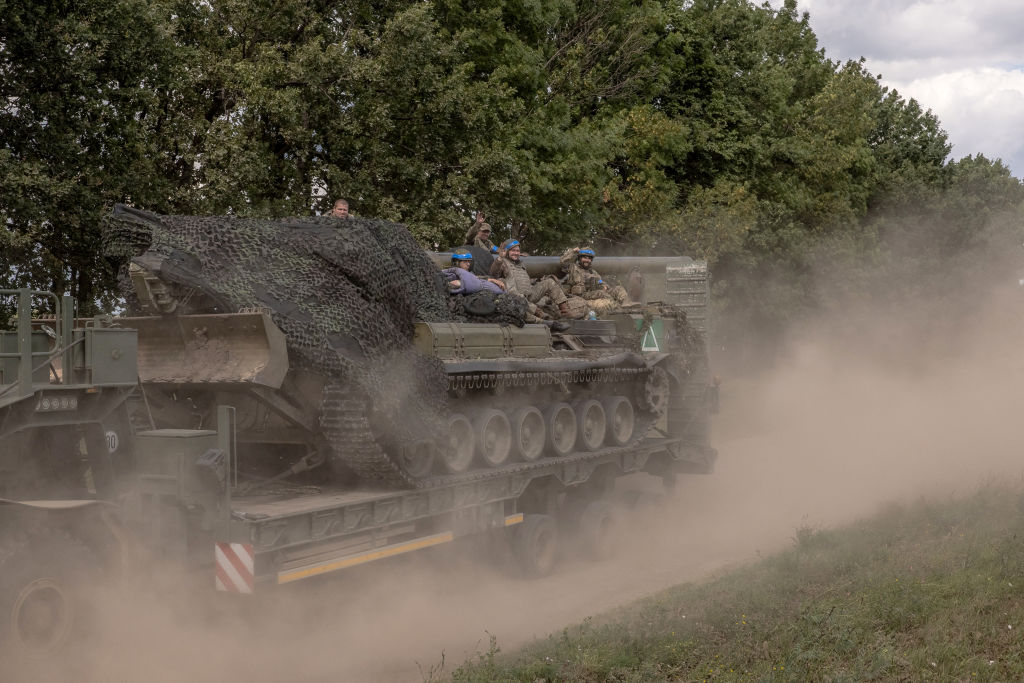
Nine hundred days ago, Russia launched its unprovoked invasion of Ukraine. Last week, Kyiv turned the tables.
On Tuesday, Ukrainian troops launched a surprise offensive into Russia’s Kursk oblast—the largest Ukrainian attack on Russian soil since the Kremlin’s invasion began in February 2022. After more than six days of fighting with an underwhelming Russian response, Ukrainian soldiers can be seen in social media video footage taking down Russian flags in some towns in the Kursk region and replacing them with Ukraine’s blue and yellow bands.
The Ukrainian offensive could mark a new stage in a war that has thus far kept Kyiv largely on its back foot. But the gambit is not without risks, and the strategic goal of the offensive—both on the battlefield and on the international stage—is not yet clear.
Ukraine has weathered incremental—but steady—losses over the past few months, particularly in its eastern Donetsk oblast. “The main problem is really a shortage of manpower,” John Hardie, deputy director of the Foundation for Defense of Democracies’ Russia program, told TMD. “Units don’t have enough infantry to hold positions, and the Russians have an advantage in manpower that allows them to conduct very frequent assaults.” Those assaults, he said, have yielded small but consistent gains for the Russians.
Russian drone and missile attacks on Ukraine have continued in recent months, including a strike on a children’s hospital in Kyiv in early July. The first delivery of U.S.-made F-16 fighter jets to the country late last month could be used to bolster Ukrainian air defenses by shooting down incoming Russian missiles and drones.
Meanwhile, it has been a difficult summer for Ukraine on the frontlines. Russia opened a new front in May near Kharkiv, the second-largest city in Ukraine. Though the United States and Ukraine declared that offensive a failure for the Russians, it still came at the expense of weeks of brutal fighting by Ukrainians.
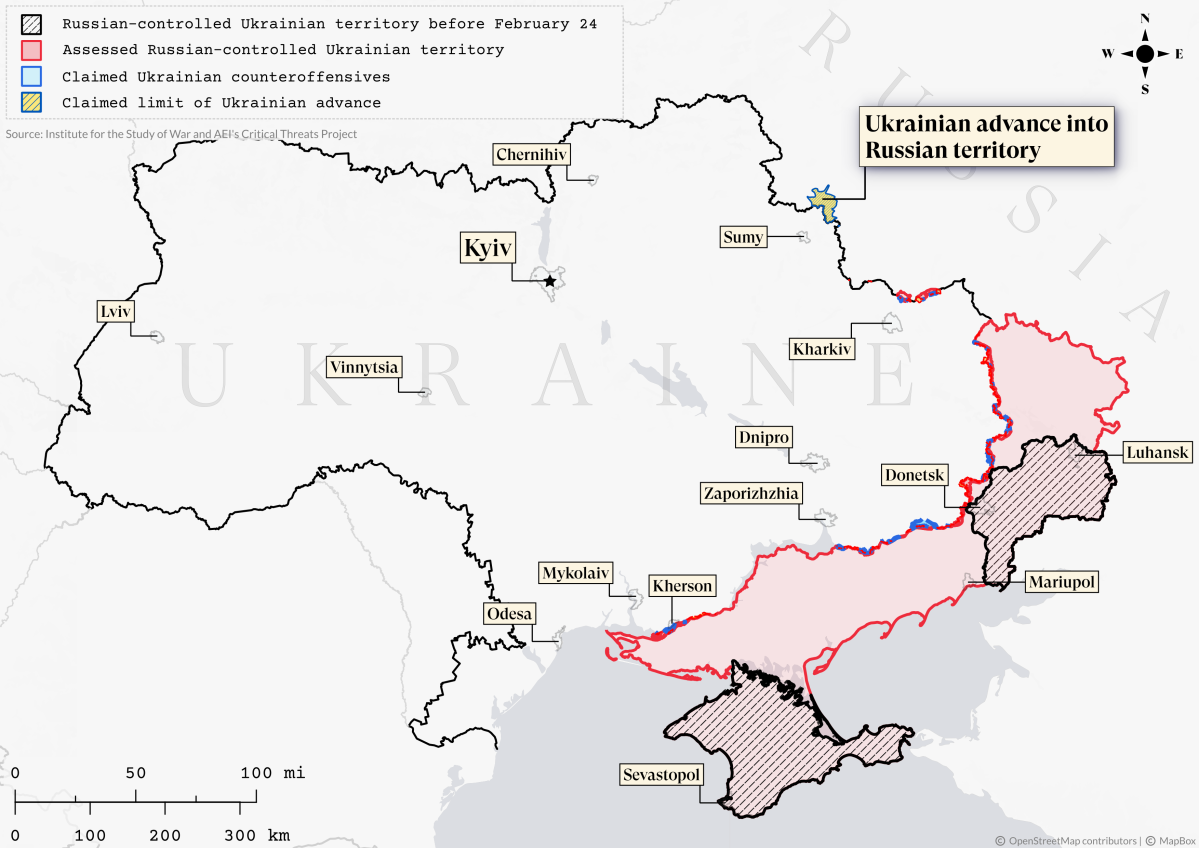
Though Kyiv has secured some marginal victories—in Crimea, or stalling the Kharkiv offensive—the year has nevertheless mostly seen Ukraine take a defensive posture. “The Russian military has had the entirety of the initiative across the theater,” said George Barros, an analyst at the Institute for the Study of War who leads its geospatial intelligence and Russia teams. “The Russian command had the flexibility to choose the time, location, density, and scale of when to conduct attacks against Ukraine for ground operations, and fundamentally put the Ukrainian command on the back foot: They could not dictate the tempo of battle. They could not choose where to fight, and they were always forced to respond.”
Last week, though, that changed.
Ukrainian troops have periodically raided Russian territory over the last two-and-a-half years, but those missions were small in scope and typically focused on gathering information rather than capturing and holding territory. Ukrainian President Volodymyr Zelensky said there had been 2,000 such raids from the Sumy region of Ukraine in the northeast into the Kursk oblast in Russia this summer alone.
On Tuesday, Russian military bloggers surfaced the first reports of a Ukrainian incursion into the Kursk region. The border between the two countries—not an active frontline of the war, per se—was poorly defended by ill-trained conscripted Russian troops: men serving their obligatory one-year terms in the military who, by law, are not generally sent to the frontlines. As invading Ukrainian soldiers encountered them, they easily captured some conscripts.
As the assault continued over subsequent days, the Ukrainian government was mum. The operation had proceeded under a veil of secrecy—surprising, given the digital nature of this war. Still, it became clear without any public pronouncement from Ukraine that this wasn’t just a raid. “The level of resources, the scale, the intensity, and the fact that the Ukrainians have maintained a larger presence within Russia over time, indicates that what we’re looking at here is not an undertaking at the tactical level,” Barros told TMD. “This is an operational level undertaking, and this is a campaign.”
It’s not evident how many Ukrainian troops are involved in the operation, though the Russian military put the number at anywhere from 300 to 1,000 Ukrainian soldiers involved in the initial attack—a figure that has likely grown in the days since. Open-source intelligence indicates Ukraine has probably committed battalions—in the hundreds of soldiers—from several brigades, which could each number as many as 2,000 troops. Videos have shown Ukrainians riding through Russian territory with U.S.-supplied Stryker armored personnel carriers and their German equivalents and transporting Howitzer artillery weapons into Russian territory.
It’s also not clear how much land the Ukrainian military formally controls at this point, though the furthest point of advance into Russia by Ukrainian troops—according to ISW’s Barros, who has mapped the conflict every day since the beginning of the war—is in the neighborhood of 650 square kilometers, or about 250 square miles, which is an area slightly larger than Chicago.
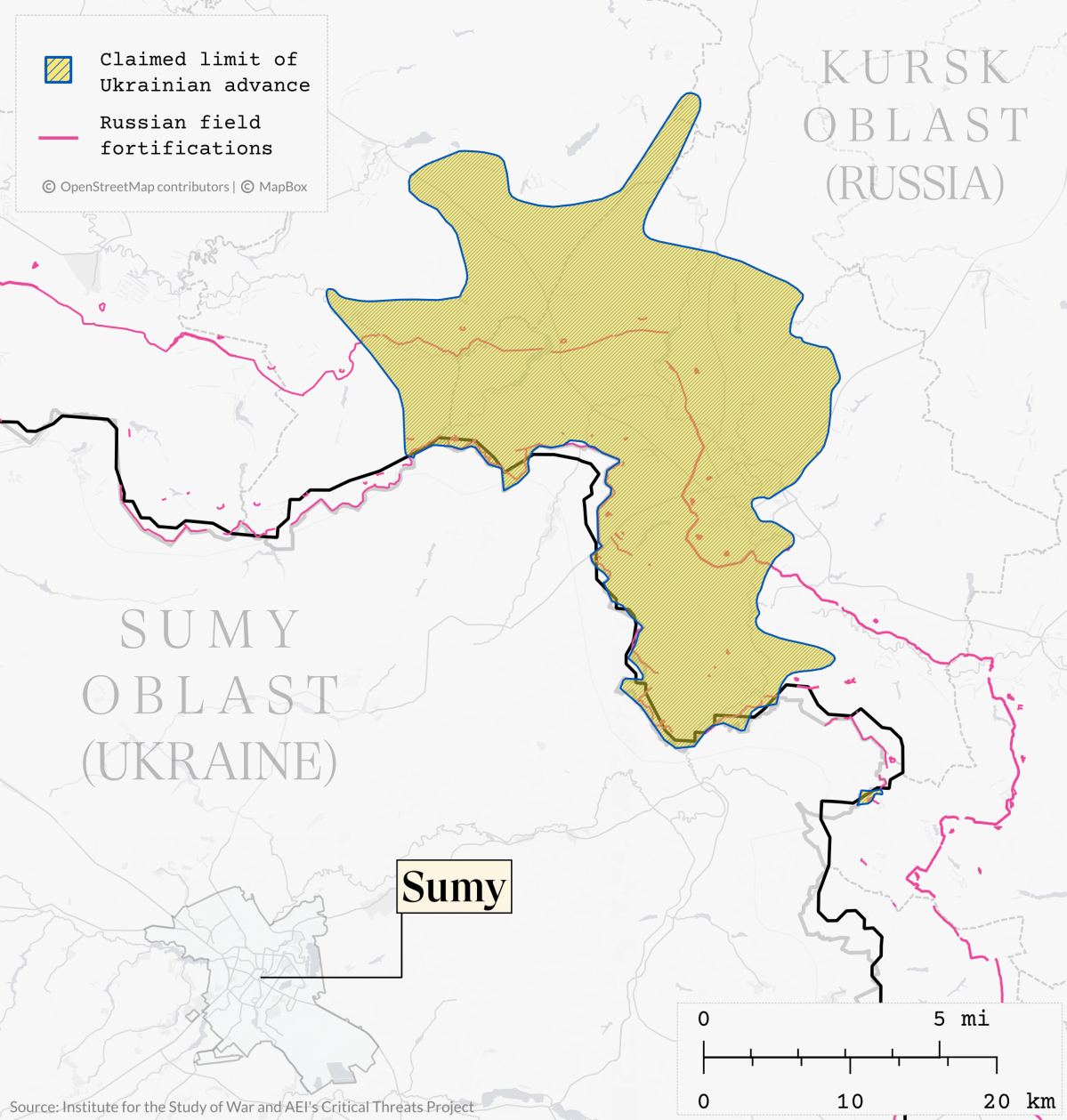
That’s significantly more territory than the Russians have succeeded in capturing in recent months. It’s roughly three times as much territory as Russia captured in all of Ukraine during the entire month of July; four times as much as Moscow took in June; and double what it captured in May, a banner month of gains for the Kremlin, according to Barros.
And Ukrainians could be ready to hold their ground. Ukrainian forces are reportedly digging trenches, an indication they’re preparing to defend the Russian land they’ve taken.
So why did Ukraine mount this new offensive? It’s still unclear, but there are plenty of possibilities. On the battlefield, it could force Russia to divert some of its forces from other parts of the frontline—like Donetsk or Kharkiv—potentially putting Ukrainian forces in a stronger position there to push back the Kremlin’s forces and recapture lost territory. Meanwhile, it could also force Russia to more fulsomely defend the international border that isn’t a part of the frontline as a potential battleground, further stretching its resources.
If that’s the aim, though, then the operation isn’t without its risks. “It could work out really well and shift momentum back in Ukraine’s favor and maybe force Russia to divert some units from elsewhere,” Hardie told TMD. “Or, in the worst-case scenario, Russia could defeat the offensive without really meaningfully weakening its attacks in Donetsk oblast and attrit what little reserves Ukraine had.”
There are other, perhaps more political, motivations as well. Bringing the fight to Russia could be a boon for Ukrainian morale, which has been worn down by a dearth of manpower; months of “shell hunger” amid stalled U.S. aid; and brutal Russian aerial attacks on civilian infrastructure, homes, hospitals, and stores, including a missile barrage targeting Kyiv Sunday that killed a 4-year-old boy.
This advance could also goose Western support for Ukraine after more than a year of bad news. The U.S., for its part, has been vocally supportive of Kyiv’s incursion. “We don’t feel like this is escalatory in any way,” Defense Department spokeswoman Sabrina Singh said Thursday. “Ukraine is doing what it needs to do to be successful on the battlefield.” It’s a far cry from the tone the Biden administration has struck over Ukraine’s request to use U.S. missiles to strike Russian territory—behavior it has mostly forbidden.
On Saturday, President Zelensky broke his silence about the operation. “Ukraine is proving that it can indeed restore justice and is ensuring the exact kind of pressure that is needed—pressure on the aggressor,” he said. The statement, though vague, hints at yet another possible aim: capturing Russian territory as leverage to regain seized Ukrainian territory in future peace talks, though such a goal is still just speculation.
Russia’s response has been slow and fairly chaotic. On Sunday, the sixth day of fighting, Russia claimed to have slowed Ukraine’s offensive with several battalions sent to defend Kursk—including nearby conscript units. Federal authorities declared a state of emergency in Kursk as thousands of Russians fled. It’s the first time Russian civilians will have felt the effects of the Kremlin’s so-called “special military operation”—the euphemistic phrase the Russian government uses to describe its invasion of Ukraine and the subsequent war—at a large scale.
The Kremlin has downplayed the incursion and responded with a “counter-terrorism” operation, clamping down on Russians’ phone communications and placing other restrictions on people in Kursk. Residents of the region on Thursday recorded a video accusing Russian President Vladimir Putin and his military staff of underreacting to—and, indeed, lying about—Ukraine’s counter-invasion and putting civilians at risk.
Barros says the understated response belies Putin’s concern that Russians will begin to understand what a quagmire his war in Ukraine has become. To react more aggressively “could potentially lead the average Russian to think,” Barros suggested, “how is it that over the course of the last couple of years, we went from ‘We’re going to seize Kyiv in a matter of days,’ and ‘It’s a cakewalk,’ to, ‘We have German armored vehicles rolling around in Russia for the first time since 1945?’”
Worth Your Time
- The Darien Gap, a highly dangerous region that serves as a land bridge between North and South America, was thought to be impassable—but migrants in search of a better life have changed that. The Atlantic’s Caitlin Dickerson accompanied migrants along their journey through the treacherous region and wrote about her experience. “We stepped over jaguar tracks and passed a Bothrops, the deadliest viper in South America, coiled around a branch near our ankles,” she recalled. “In a ravine, we saw what looked like the scene of a person’s bad fall: a tennis shoe, a skull, and the bones of a leg with a bandage wrapped around the knee like a tourniquet. … The next morning, we faced the route’s hardest obstacles, a series of rock faces. Ropes had been strung across some of them, but it was impossible to know which were secure enough to hold on to. ‘Oh my God, I can’t watch,’ María Fernanda said when her 7-year-old daughter crossed the rock. She covered her eyes and shouted, ‘Hold on tight, my princess!’”
- Should we be concerned that the United States tied China in total gold medals at the 2024 Paris Olympics—even though the U.S. vastly led in the total medal count? In his Matzko Minute Substack, Paul Matzko argued the answer is no. “Optimizing for success at the Olympics requires creating institutions that are, paradoxically, a signal of political economic failure,” he wrote. “State support for Olympic hopefuls housed at centralized sporting schools can indeed boost medal counts, but that requires a kind of singular obsession with performative national greatness that is the antithesis of a truly free and prosperous society. … The simple truth is that pursuing Olympic glory is unprofitable. … There’s a reason Jason Kelce, for instance, played professional football rather than becoming a shot-putter or weightlifter.” This arguably provides a better experience for sports fans, too: “I myself would much rather watch the Kelce bros on the football field sixteen times a year than once every four years at the Olympics competing in a sport that I routinely forget exists.”
Presented Without Comment
Former President Donald Trump, on Vice President Kamala Harris’ recent campaign rallies:
Has anyone noticed that Kamala CHEATED at the airport? There was nobody at the plane, and she “A.I.’d” it, and showed a massive “crowd” of so-called followers, BUT THEY DIDN’T EXIST! She was turned in by a maintenance worker at the airport when he noticed the fake crowd picture, but there was nobody there, later confirmed by the reflection of the mirror like finish on the Vice Presidential Plane. She’s a CHEATER. She had NOBODY waiting, and the “crowd” looked like 10,000 people! Same thing is happening with her fake “crowds” at her speeches. This is the way the Democrats win Elections, by CHEATING - And they’re even worse at the Ballot Box. She should be disqualified because the creation of a fake image is ELECTION INTERFERENCE. Anyone who does that will cheat at ANYTHING!
Also Presented Without Comment
Former Vice President Mike Pence, on the 2024 Republican Party platform:
The fact that we have a platform that removed 50 years of pro-life language, made no mention of the national debt, advocated [for] massive taxes at our borders, and abandoning commitments that we have to allies around the world is deeply troubling to me and deeply disappointing.
Also Also Presented Without Comment
Wired: A Russian Chess Player Allegedly Poisoned Her Opponent With Mercury
In the (Olympic) Zeitgeist
The 2024 Summer Olympics drew to a close yesterday after two solid weeks of incredible feats of athleticism—and some less-than-incredible feats. We’ll admit to shedding a patriotic tear as Stephen Curry drained three-pointer after three-pointer to clinch gold in the basketball final against France, but the real story of these Olympics may be the sheer number of times U.S. women were so far ahead of the competition that the other athletes were not even in the frame. 🇺🇸 🇺🇸 🇺🇸

Toeing the Company Line
- In the newsletters: The Dispatch Politics team offered a look at Vice President Kamala Harris’ campaign rallies in swing states last week, Nick predicted (🔒) independent presidential candidate Robert F. Kennedy Jr. could endorse Trump before November’s election, Jonah explained what he thinks Minnesota Gov. Tim Walz got wrong about socialism, Chris highlighted how (🔒) Harris’ progress in the Arizona polls have raised national hopes for Democrats, and John Inazu offered insight into what “cancel culture” is—and what it isn’t—in Dispatch Faith.
- On the podcasts: Jonah ruminated on the diminishing standards of acceptable presidential candidate behavior on this weekend’s Remnant, and today, Jamie is joined on The Dispatch Podcast by Daily Beast columnist Matt Lewis to discuss the shifting dynamics of the 2024 presidential race.
- On the site over the weekend: Alex and Leah fact-checked claims about Minnesota Gov. Tim Walz’s military career, Elayne Allen reviewed a new book from Anastasia Berg and Rachel Wiseman about natalism and child-rearing, Christian Alejandro Gonzalez argued Amazon’s series The Boys backed its overarching political narrative into a corner, and Scott Salvato offered a primer on the Druze religion after a Druze community in Israel was attacked by Hezbollah last month.
- On the site today: Annalise DeVries explains the riots raging in the United Kingdom right now and John Gustavsson walks readers through the five stages of entitlement reform grief.
Let Us Know
What do you think the aim of Ukraine’s gambit is? Will it be successful?




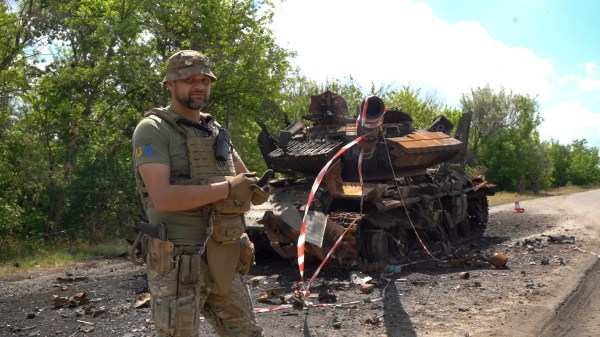
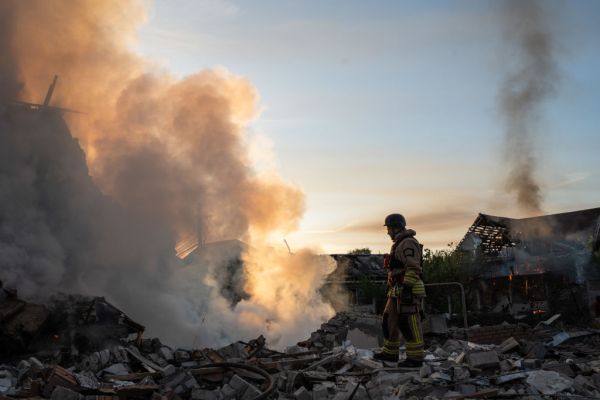

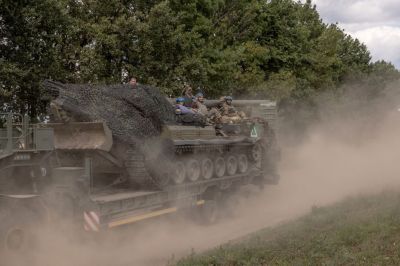
Please note that we at The Dispatch hold ourselves, our work, and our commenters to a higher standard than other places on the internet. We welcome comments that foster genuine debate or discussion—including comments critical of us or our work—but responses that include ad hominem attacks on fellow Dispatch members or are intended to stoke fear and anger may be moderated.
With your membership, you only have the ability to comment on The Morning Dispatch articles. Consider upgrading to join the conversation everywhere.